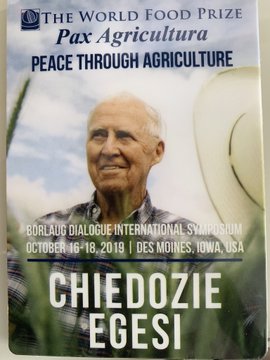 16-18 October 2019. Des Moines, Iowa. The "Borlaug Dialogue," each year brings together over 1,200 people from more than 65 countries to address cutting-edge issues related to global food security and nutrition.
16-18 October 2019. Des Moines, Iowa. The "Borlaug Dialogue," each year brings together over 1,200 people from more than 65 countries to address cutting-edge issues related to global food security and nutrition.The three-day conference convenes a wide array of scientific experts, policy leaders, business executives and farmers and has been called "the premier conference in the world on global agriculture."
The theme for the 2019 Symposium, “Pax Agricultura: Peace Through Agriculture,” addressed the increasingly inter sectional issues of food security, conflict and development. With topics ranging from religion, diplomacy, climate, scientific innovation, and corporate leadership, this year’s Dialogue served as an opportunity to take stock of the current state of global agriculture and food security.
Extracts of the programme:
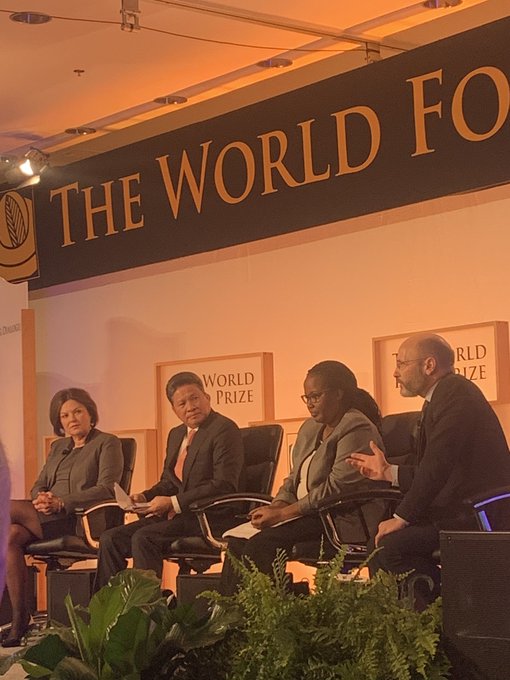 |
| "In the 1994 genocide in Rwanda, more than 1 million people died in 100 days. In the rebuilding process, all policies were centered around agriculture". Geraldine Mukeshimana. |
Panel | Healing the Wounds: The Power of Agriculture in Post-Conflict Recovery
- Ms. Heidi Kuhn, CEO, Roots of Peace
- Hon. Dr. Gerardine Mukeshimana, Minister of Agriculture and Animal Resources, Rwanda
- Dr. James Smith, CEO, Aegis Trust
- Hon. Chanthol Sun, Minister of Public Works and Transportation, Cambodia
- Moderator: Amb. Kenneth M. Quinn, President, World Food Prize Foundation
Panel | Food Security in the Next Decade: The Power of the Private Sector
- Mr. James Collins, CEO, Corteva Agriscience
- Mr. Liam Condon, President, Crop Science Division, Bayer AG
- Mr. Erik Fyrwald, CEO, Syngenta
- Dr. Chris Nelson, President & CEO, Kemin Industries
- Ms. Josephine Okot, Managing Director, Victoria Seeds Ltd.
- Moderator: Ms. Cynthia Hardin Milligan, President & CEO, Wood Stieper Capital Group
Keynote | The Gates Initiative Ten Years Later
- Mr. Rodger Voorhies (see picture), President, Global Growth and Opportunity Division, The Bill and Melinda Gates Foundation
- Dr. Gebisa Ejeta, Director, Center for Global Food Security
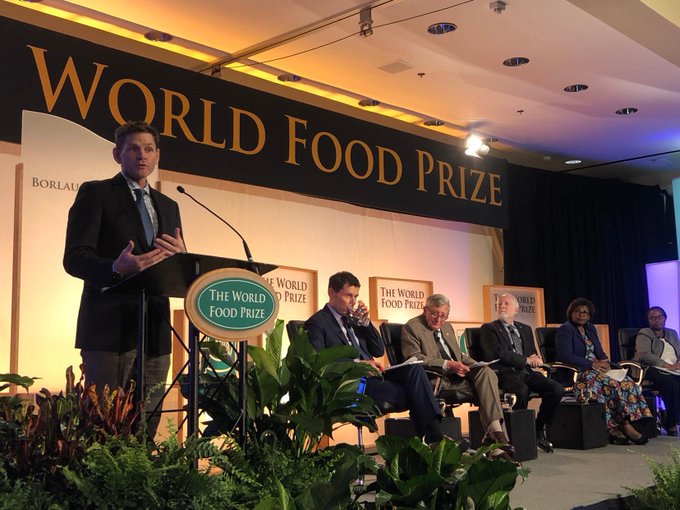
Panel | The Alliance for a Green Revolution in Africa
- H.E. Agnes Kalibata, President, AGRA
- Dr. Emma Naluyima, Farmer and Private Veterinarian
- Professor Joachim Von Braun, Director of The Center for Development Research, Co-Chair of the Malabo Montpellier Panel, University of Bonn
Panel | Getting to Zero Hunger: Research for Resiliency
- Prof. Dr. Ir. Louise O. Fresco, President Executive Board Wageningen University & Research
- Hon. Ken Isley, Administrator, USDA-FAS
- Hon. Chavonda Jacobs-Young, Administrator, USDA-ARS
- Dr. Thomas Thompson, Associate Dean and Director of Global Programs, Virginia Tech College of Agriculture and Life Sciences
Panel | Collaboration or Catastrophe: Global Trends in Agricultural Development
- Dr. Shenggen Fan, Director General, IFPRI
- Ambassador John Negroponte, Vice Chairman, McLarty Associates
- Dr. Ismail Serageldin, Founding Director Emeritus & Member of Board of Trustees, Library of Alexandria, Egypt
- Ambassador Josette Sheeran, President and CEO, Asia Society
2019 Borlaug Dialogue Breakout Sessions
Unpacking "Crops to End Hunger"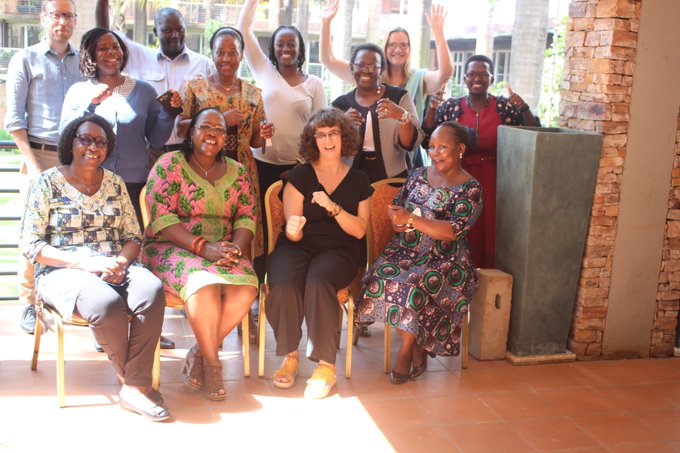 |
| Dr Hale Ann Tufan (front row,2nd left) receives the 2019 Borlaug Field Award for her outstanding work in integrating gender in breeding programs and agricultural research. |
Click on above link for the PAEPARD blogpost
U.S. - Africa Forum on Agricultural Technology
The U.S.-Africa AgTech Forum brought together stakeholders from government, business, academia and multilateral institutions to take stock of the agriculture sector in Africa and identify opportunities to enhance efficiency, productivity, and sustainability by incorporating technology across agricultural value chains.
- Mwangi Kiunjuri - Cabinet Secretary of Ministry of Agriculture, Livestock, Fisheries, & Irrigation for the Republic of Kenya
- Hon. Ursula Owusu-Ekuful - Minister of Communications for the Republic of Ghana
- Dr. Jennifer Blanke - Vice President, Agriculture, Human and Social Development - African Development Bank
- Dr. Ed Mabaya - Manager, Agribusiness Development - African Development Bank
- Parmesh Shah - Global Lead for Rural Livelihoods and Agricultural Jobs - World Bank
- Tavonga Alex Siyavora - Program Manager - John Deere
- Kommy Weldemarian - Chief Scientist - IBM Research- Africa
- Mark Edge - Director of Collaborations for Developing Countries - Bayer
- Mark Chiavello - Representative of South Africa to the United States - Standard Bank
- Sara Eckhouse - Executive Director - Foodshot Global
- Paul Sheppard - Founder Future Farms
- Aboubacar Karim - CEO Investiv
- Jehiel Oliver - CEO Hello Tractor
- Paul Sheppard - Co-Founder - Future Farms South Africa
The session brought together leaders in science, policy and investment to understand the opportunities and challenges associated with the application of next generation technologies to transform food systems and achieve the SDGs, and develop suitable actions in their respective capacities.
- Kenneth M. Quinn - President World Food Prize Foundation
- Svend Christensen - Head of Department, Department of Plant and Environmental Sciences
- University of Copenhagen
- Mario Herrero - Chief Research Scientist - Commonwealth Scientific and Industrial Research Organisation (CSIRO)
- Diego Osorio - Head of Partnerships and Resource Mobilization - CGIAR Research Program on Climate Change, Agriculture and Food Security (CCAFS)
- Akinwumi Adesina - President African Development Bank
- Jan Low - Principal Scientist International Potato Center (CIP)
- Ruben Echeverria - Director General International Center for Tropical Agriculture (CIAT)
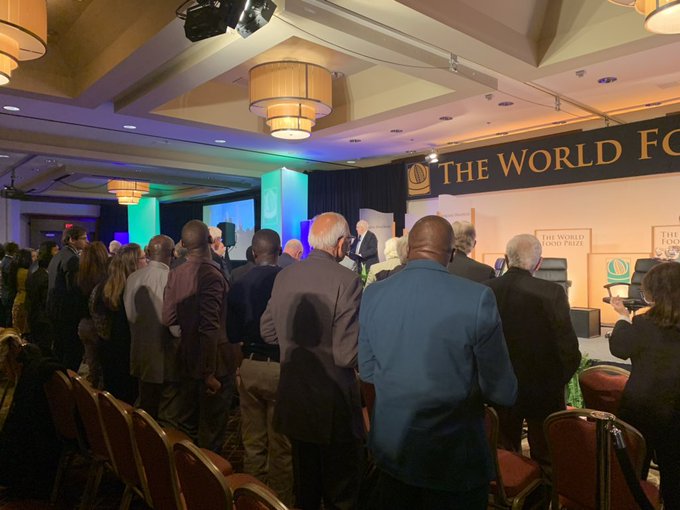 Systems for Change: Seeds and Vegetables to Transform Smallholder Agriculture for Global Food and Nutrition Security
Systems for Change: Seeds and Vegetables to Transform Smallholder Agriculture for Global Food and Nutrition SecurityVegetable crops play a key role in addressing the triple burden of malnutrition (undernutrition, overweight and obesity) rapidly rising in many countries. Yet, due to a lack of quality seed, the power of vegetables remains an under-utilized tool for curbing these alarming trends. Backed by a more robust seed system, smallholder farmers can produce safe, nutritious vegetables to promote healthy diets, generate rural employment, and develop sustainable businesses for themselves and their communities.
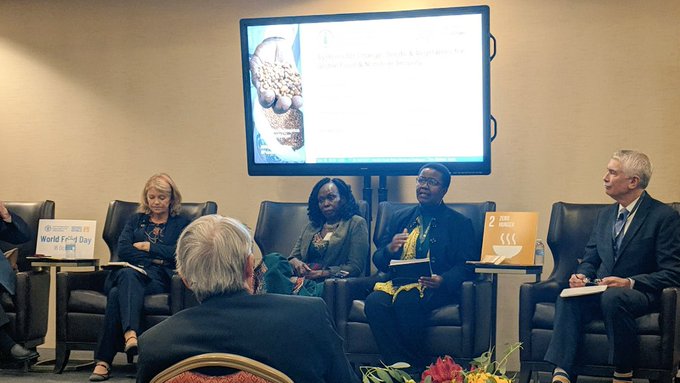 |
| 'In Zimbabwe, many farmers are still not having access to affordable quality seeds - Lindiwe Sibanda |
- Vimlendra Sharan - Director, Liaison Office for North America - FAO
- David Beckmann - President Bread for the World and 2010 World Food Prize Laureate
- Kenneth Quinn - President World Food Prize
- Simon Groot - 2019 World Food Prize Laureate
- Rob Bertram - Chief Scientist, Bureau for Food Security - USAID
- Marco Ferroni - Chair, System Management Board CGIAR
- Josephine Okot - Managing Director Victoria Seeds Ltd
- Lindiwe Sibanda - Board Member World Vegetable Center
- Ann Tutwiler - Strategic Adviser, Transforming Agri-Food Systems, and Board Chair Access to Seeds Foundation
 Feed the Future Innovation Labs: The Global Payoff of Investing in Research for Development
Feed the Future Innovation Labs: The Global Payoff of Investing in Research for DevelopmentThis event showcased the innovations developed through the Feed the Future Innovation Labs and how they improve incomes and livelihoods in developing countries and provide benefits to the U.S.
Six Innovation Lab’s presented findings BIFAD-commissioned study: “How the United States Benefits from Investments in Developing Country Agriculture and Food Security”. (October 2019, 44 pages)
This report describes the food security investments of the U.S. Agency for International Development and how improving agriculture in developing countries brings positive returns to the United States and developing countries. The multiple benefits of foreign agricultural assistance include growth of agri-food systems of developing countries, and positive impacts on U.S. jobs and exports, technology spillovers that support U.S. agricultural production, health and nutrition of U.S. consumers, and global and U.S. security.
- Dr. Adegbola Adesogan - Director, Livestock Systems Innovation Lab and Chair Council of Innovation Lab Directors - University of Florida
- Dr. Jack Payne - Associate Vice -President Agriculture and Natural Resources, University of Florida, Institute for Food and Agricultural Sciences
- Beth Dunford - Assistant to the Administrator - USAID, Bureau for Food Security
- Gebisa Ejeta - Board member, Board for Food and International Development (BIFAD); WFP laurate; Distinguished Professor - Purdue University
- Brady Deaton - Board member, BIFAD; Chancellor Emeritus - University of Missouri
- Tim Dalton - Director, Feed the Future Innovation Lab for Collaborative Research on Sorghum and Millet - Kansas State University
- Peter Goldsmith - Director, Soybean Innovation Lab - University of Illinois at Urbana Champaign
- Pamela Anderson - Board member, BIFAD; Director General Emeritus - International Potato Center (CIP)
 How Israel achieved its agriculture transformation: lessons for developing countries
How Israel achieved its agriculture transformation: lessons for developing countriesPresentation of a new report developed by AGRA, Tony Blair Institute and Volcani International Partnerships on How Israel developed its agriculture and water sectors: Insights for today’s developing countries (September 2019, 52 pages) to become a leading agriculture player on the global stage, followed by an open discussion of lessons and insights for today’s developing countries – particularly Africa which has yet to achieve its green revolution.
- Jonathan Said - Head of Inclusive Growth Tony Blair Institute
- Danielle Abraham - Executive Director - Volcani International Partnerships
- Dr. Agnes Kalibata - President - Alliance for Green Revolution in Africa

No comments:
Post a Comment